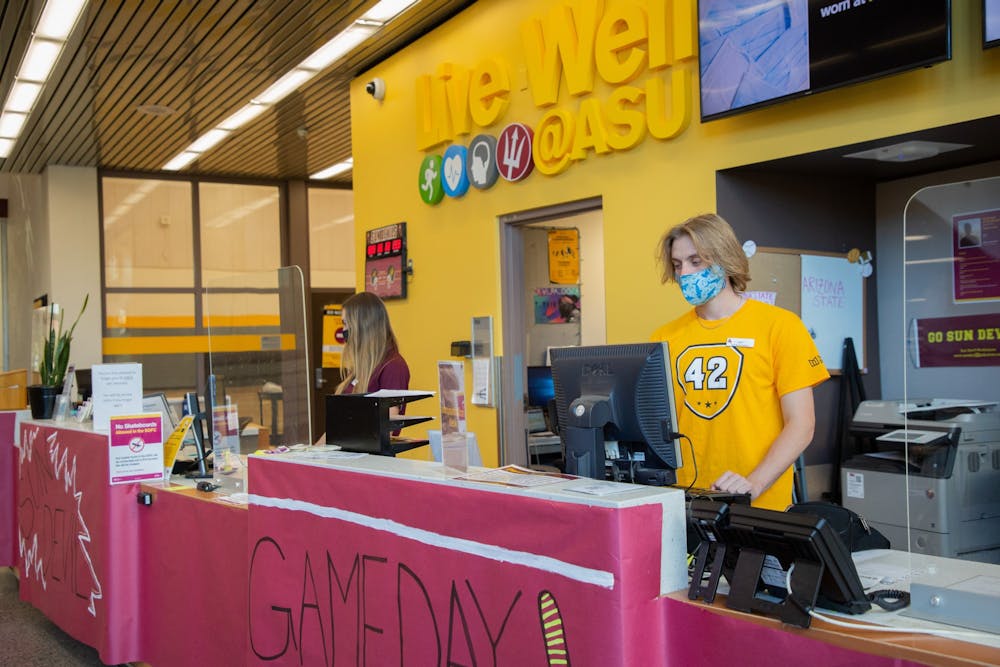Student workers say they have faced challenges during the transition from in-person work spaces to online settings including scheduling, communication and motivation. When the University moved online in March due to COVID-19, some students took on completely different responsibilities.
Senior political science major Savannah Jacobs is a student worker at the Center for Indian Education. Jacobs assisted staff and faculty in research, planning campus events at the center and attending in-person, biweekly meetings for Turning Points Magazine as a research assistant receptionist before the pandemic.
Now, in a remote setting, Jacobs said she is assigned minimal responsibilities such as working on spreadsheets and collecting contact information. Instead of working on multiple projects a week, Jacobs said she is only assigned one or two “online-friendly” tasks.
Although the workload is significantly less rigorous, Jacobs said the transition to an online setting has been demotivating.
“Now that I work remotely and online at home for the majority of my day, I feel like I don’t really have a schedule anymore,” Jacobs said. “I feel like I don’t have a work study job anymore.”
As a research aide at the Center for the Study of Economic Liberty, junior economics major Camille Hanzlick works on an annual project called Doing Business North America studying and reporting the difficulty of setting up a business in a specific area.
Hanzlick would work in offices among other staff and student workers to collaborate on assignments on an average day before the pandemic. Now, working remotely, she relies on Slack, a business communication platform, and Zoom to communicate with other team members and supervisors.
“Whenever I had a question ... I would literally just pop in (the office) after class, or I would just take a short walk over there so I could sit down with my boss,” Hanzlick said.
READ MORE: The new balance between Zoom classes and work schedules
Although scheduling meetings is more difficult now for Hanzlick, she said her supervisors have been very accommodating and active on the different communication channels for the program.
“I know it probably has been more difficult for him trying to coordinate with everyone but he’s definitely doing the best he can and I think he’s doing a good job.”
Usually an in-person operation, America Reads, a tutor and mentoring program through ASU that works with K-8 students from Title I schools, has had to move some of its operations to an online setting. A recent addition to the program is its YouTube channel where they post lessons and activities for students.
Lizbeth Torres, a junior studying criminology and criminal justice, works remotely for her responsibilities as the supervisor for the YouTube channel production team. Transitioning to an online setting was difficult at first, but working closely with the program coordinator helped ease the stress of change, Torres said.
“Building those connections with tutors has been different than when the way it was when we had in-person interactions,” Torres said. “We definitely try to be as flexible as possible with their schedule.”
Though some tutoring centers are open with smaller student-to-staff ratios to observe social distancing guidelines, most operations are being held online, said Rob Adams, America Reads program coordinator.
Tutors have had to find creative ways to engage students virtually, Adams said.
“I think primarily I would notice resiliency amongst the student workers, which has been really great to see their willingness to step up to the plate, deal with the change and put in the extra effort to make what we’re doing work for the students,” Adams said.
He said student workers involved in the program have been conceptualizing new ideas and concepts to incorporate into the online program. For the majority of student workers involved with the program, this has been a way for them to explore new ideas, but others are struggling to adapt to the online environment, he said.
"That other side is those students who are really struggling with the change and having trouble managing their time now that they are not having to go to a site or be somewhere at a certain time and their time commitments seem to weigh on them a lot heavier," Adams said.
Reach the reporter at kncasti1@asu.edu and follow @kristencasti11o on Twitter.
Like The State Press on Facebook and follow @statepress on Twitter.
Kristen Apolline Castillo is the community and culture editor for The State Press. She has been working for the publication for two years, where she also reported for the desk.




